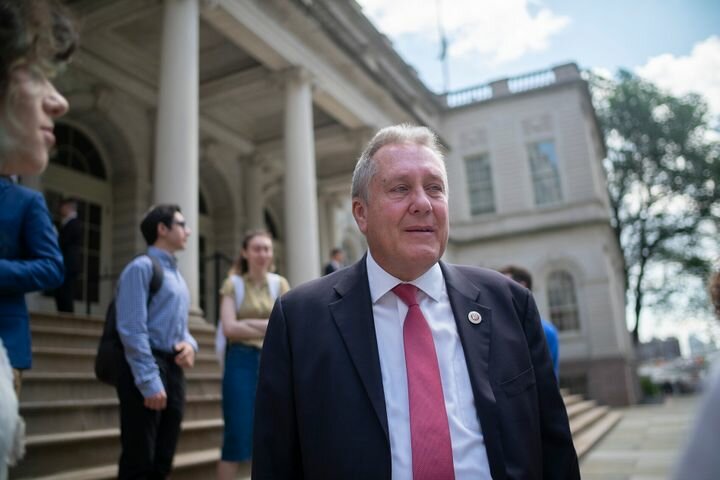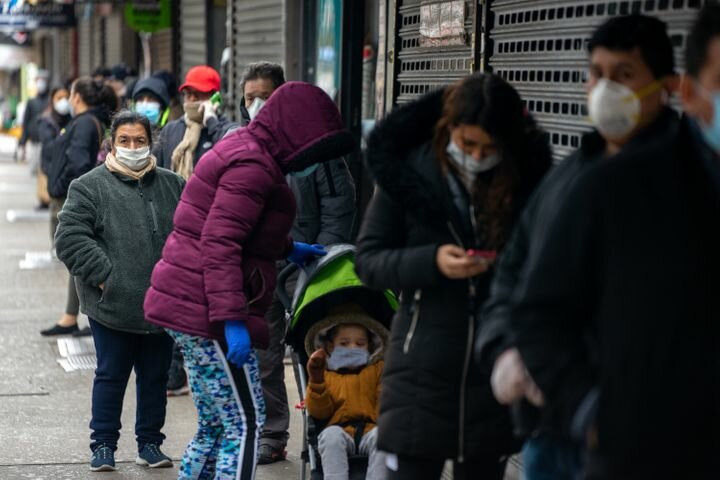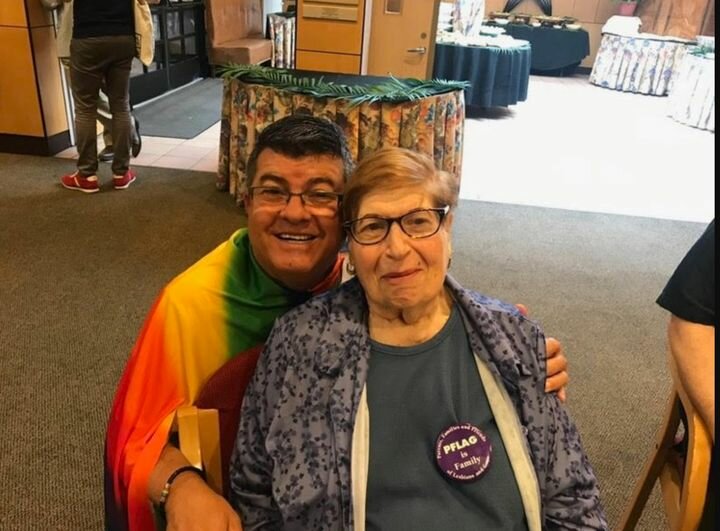Daniel Dromm’s district in Queens has become one of the epicenters of the pandemic in New York City, which itself is the epicenter of the virus in the world.
.
By Christopher Mathias
Originally published in the Huffington Post on April 15, 2020
NEW YORK — As the coronavirus pandemic has ravaged New York City, so far killing over 10,000 people, it’s laid bare the harsh racial and social inequities in the five boroughs.
About 80% of the city’s frontline workers — grocery store cashiers, nurses, bus drivers, food delivery drivers — are Black or Latino. Look at a map of where they live in the city, and then compare it to a map of the most concentrated outbreaks of COVID-19, and you’ll see many of the same neighborhoods highlighted in red.
One of the hardest-hit working-class neighborhoods is Jackson Heights in Queens — one of the most diverse places on the planet. Daniel Dromm, who’s represented the neighborhood for 10 years in the city council, tweeted earlier this month that he’d already lost five friends in the pandemic, underscoring the desperate situation there.

WILLIAM ALATRISTE FOR NEW YORK CITY COUNCIL
Daniel Dromm, who represents Jackson Heights in Queens, says he’s lost eight friends in the pandemic.
Dromm talked to HuffPost about the growing food emergency in his community, how Gov. Andrew Cuomo (D) needs to release people in state prisons now, the need for rent relief, and how, sadly, he’s lost even more friends over the last couple of weeks.
You call your district the “epicenter of the epicenter.” What makes your district specifically so vulnerable to all this?
Well, we have a lot of service workers that live here, undocumented folks that live here, immigrants who are here, and oftentimes, we see that those folks are of lower income, and in order to survive, they have to live in overcrowded, illegally converted homes, which only makes the spread of COVID worse. So there’s really no place for many people who live in my community to self-isolate because sometimes they live 20 to 25 people in a house. We’ve seen this on numerous occasions here in the district.
So that closeness and that density in the neighborhood is, I think, one of the major contributing factors to COVID. Now, even those of us who are as fortunate as I am, I have a one-bedroom apartment for myself, there’s still the density of the neighborhood so that when you walk down on 37th Avenue, which is kind of like one of the main strips in Jackson Heights, it’s very hard to not bump into somebody or meet somebody that wants to talk.
That was always the case before COVID and in a sense, it was very quaint, very nice, because it’s kind of like a small town in the big city. But of course, that type of interaction between people as well is another contributing factor to the spread of COVID.
So something that for years we liked about the neighborhood, which was that social gathering and connections, now we’re being forced to socially distance, and that’s something we in Jackson Heights and Elmhurst are unfamiliar with. And so I think the density, the poverty, the lack of health care, all of those things have been contributing factors to the spread of the virus.
What is the most urgent thing your constituents need from the state or federal government that they’re not getting right now?
So it’s kind of changed a little bit. Elmhurst Hospital seems to be a little bit better off than it was. Not much, because every single bed is taken — 545 beds taken at Elmhurst. But my on-the-ground type of feeling is that people now are seeking food.
A number of the supermarkets in the neighborhood had closed down, including Patel brothers, two Asian supermarkets on Broadway, most of the fruit stands and food stores along 37th Avenue closed down, so people were short of food simply by virtue of stores closing, but then again on top of that, you have those who can’t even afford it anymore because they’ve lost their job.

DAVID DEE DELGADO VIA GETTY IMAGES
Dozens of people stand in line outside of Seatide Fish & Lobster market to purchase fish on Good Friday on April 10, 2020, in Jackson Heights, Queens.
So people like taxicab drivers — I have a large constituency of cab drivers — they’re not really working anymore. Many of them are undocumented and don’t have access to SNAP benefits. So food has become last week’s and this week’s biggest issue to conquer. I was lucky that working with Grow NYC, I was able to get 300 boxes of food to be distributed at the United Sherpa Society started this week, and that’s going to last for another 12 weeks.
So finding food and getting access to food is an issue. And then even those who are fortunate enough to have an income or be able to pay for food are facing very, very long lines outside the supermarket, sometimes a block or two long, just waiting to get into the supermarkets that are open. So that is a big issue at this point.
Is there anything that D.C. or Cuomo in Albany can do to alleviate that problem?
So actually, I’m going to be having a conference call with Sen. [Chuck] Schumer and Sen. [Kirsten] Gillibrand and a few of the congressional delegates tomorrow, and that’s my major concern that I’m going to raise is, particularly for undocumented communities who are not eligible for SNAP benefits, what type of provisions are being made for them?
And also a number of food banks have closed in the area — because, one, of the volunteer shortage and two, because of the lack of food availability, but what type of provisions are going to be made for that?
So you were talking before about how this pandemic has kind of unmasked a lot of racial and economic inequalities that were already there, that maybe people in other neighborhoods or districts weren’t paying attention to. Being in the epicenter of the epicenter of this crisis, has it changed your worldview at all? Are there bigger changes that need to be made after all this is over?
Yes, absolutely. I think what we have to do is really come to a realization: Who are our essential workers? OK. These folks that live in my district are the essential workers during this COVID crisis. They’re the aides in the hospitals, they’re the people who are doing the work in the restaurants. They’re the folks who are driving the buses and operating the trains. And so, you know, oftentimes when people think about essential workers, maybe they think of an elected official, maybe they think of some rich guy in Manhattan, whatever. But really what it comes down to are these people, our community, both documented and undocumented, who are risking their lives on a daily basis for everyone else, and to me, that’s something that’s really jumped out at me.
These delivery men, these delivery men who bring us our takeout orders. They’re essential, OK? They are essential to us and to the economy. And we have to look at that and in the future reward them with paid time off, sick days, etc., because we realize now how essential they are.
Gov. Cuomo has gotten a lot of accolades, and his poll numbers are up, and I was wondering if you thought that was deserved?
You know, I have a real policy difference with Gov. Cuomo on the issue of how he has treated our New York state prisoners. They’re some of the most vulnerable people in the whole state because they are packed into prisons with very, very little to prevent the virus. They don’t have enough soap, they don’t have enough sanitizer, they don’t have masks, and the most insulting part of it is that the staff does! The corrections officers have that and have access to that but the poor people who are stuck in jail, don’t have access to any of that.
And like Rikers Island, I think today had 383 cases of COVID among the detainees, and I make a differentiation there between detainee and inmates because they haven’t been convicted yet, but upstate, upstate is where the governor has control, and he has done nothing, and he shot down reporters.
So I plead with the governor, to please release the — especially the elderly people who are in prison, and those who are near the end of their term, to release them from prison, because they should not be getting a death sentence simply because they are packed into these prisons. And ultimately, that’s what’s going to happen if we don’t deal with this issue immediately.
OK. And just to be clear, you’re saying he should release elderly people and people near the end of their term but would you even go further than that?
I would. I would look at all records of people who could potentially be eligible for relief. Because very few people in New York state prisons are on life terms, and there’s no death penalty, but by leaving them in prison at this point, you know, it’s really a matter of saving their lives. And so, the whole thing needs to be examined and we need a real change there. And overall, I think he has shown a lot of leadership, but this is one of the things that I think just sticks out in my mind. They have nowhere to go and it just to be looked at.
There’ve been some reports about there being an outbreak among homeless shelters at the moment, and also in NYCHA residences. What solutions do you see for those problems?
Well, yeah, I mean, it’s very similar to the issue that we’re facing here in terms of overcrowding, within our immigrant community, and I’ve been pushing the mayor for about two and a half weeks now to open up these hotels and get people into hotels. There are enough hotels probably to house, I don’t know how many people really because I don’t have a grip on that, but to have a lot of people, let me put it that way.
And there’s been some hesitancy on the part of the De Blasio administration in that direction, although now they are finally moving in that direction…
The other thing I’m seeing here in the community is people who are in Elmhurst Hospital, they’ve been taken in because they have severe symptoms of the virus, or they have for four or five days, maybe a little longer, but then they’re released but they have no place to go to convalesce. So you know, they go back to their overcrowded conditions where somebody else is infected and who knows, they could infect somebody else or whatever. And in some instances where people don’t even want them back into the overcrowded homes to begin with.
So we’ve been working with Mitch Katz, the head of Health and Hospitals, to at least get those folks who are being released with nowhere to go, to be aware that there is now going to be implemented this program of the availability of a hotel room for a period of convalescence. So that is supposed to be happening as of today.
What needs to be done that’s not being done when it comes to rent?
I think we have to have a rent freeze and the mayor has called for that by the Rent Guidelines Board, and I think there need to be some federal dollars because even if we have a rent freeze, it’s still not going to protect those tenants if they can’t catch up for three, six, eight, nine months, whatever it may be. To expect them then to pay back all that rent when they don’t have an income or haven’t had an income is going to be a very hard burden, particularly on my constituents, but on anybody who finds themselves in that type of situation. So a rent freeze and some type of federal balance to help with the payment of rents.
And so on April 1, you tweeted that you’ve lost five friends to the virus, and I’m very sorry for your loss.
Thank you.
And I hate to ask, but has that number grown since?
Yeah, yep. I’d say it’s about — of personal friends — eight or nine now. [Editor’s note: It’s eight people. Their names are Lorena Borjas, Priscilla Carrow, Father Antonio Checo, Tarlach MacNiallais, Anne Quashen, Joe Hennessy, Gloria Lippman, and Joe Forman.]
Which is just incredible. And then, of course, I’m the councilman for the area and I’ve heard about, you know, at least two dozen, maybe almost 30 people in the community who have died.

JIM BURKE
LGBT activist Anne Quashen, right, seen here celebrating shortly before the 2019 Queens Pride Parade kick-off in Jackson Heights, Queens, recently died of the coronavirus.
I just found out this morning that a woman who lives in my building complex, not in my exact building, but within the complex, her name is Gloria Lippman, she died last night. She was only 75 years old. But, you know, I used to see her in the neighborhood all the time. She’d go [puts on thick New York accent] “Dannyyy! How are youuu?”
So you know, I hear of maybe one [death] a day. And it’s just too much death. It’s just too much death for anyone to bear.
Well, that was my next question. How are you bearing it? Like, what kind of toll is it taking on you?
I try to keep moving forward. One of the people who was in the original batch of five when I tweeted that out, his name was Tarlach MacNiallais, and he was a member of the St. Pat’s For All Parade, you know, the inclusive St. Patrick’s Parade that we have here in Sunnyside, Queens. So I think that one kind of hit me the hardest because he was the one who was I was closest to.
But I also just lost one of the founding members of PFLAG Queens. Her name is Anne Quashen. She was older, she was 88. And she died on Friday afternoon.
So it’s hard to say, you know, I just keep going forward because that’s all you can do, you know. And what makes it worse is that there’s no grieving period that, you know, you can get together with people and hug and console each other.
For Tarlach, we did an online or a virtual funeral, and a virtual Irish funeral, which went on for six hours. … There were people from Ireland on it, so … at least you can see people that might not otherwise be able to fly here, but you realize how important those things are, you know, to the grieving process. And so without it, all you can do is just keep going and, you know, try to get up each day and do what you can to get to the end of this.
Do you see a light at the end of the tunnel now? Are we at that point?
Well, I’m always optimistic. You know, I like to say I survived one crisis, the AIDS crisis or the AIDS epidemic, right, and we survived other things as well. 9/11 and other catastrophes. … I’m of the age of Vietnam. I didn’t go to Vietnam, you know, but that was a disaster. I remember the oil crisis where you couldn’t get oil [for] your cars.
Eventually, we came out of all of that, and it’s part of our lived experience. So, yeah, I’m hopeful. You know, I think we’ll get through this and maybe even be more united as a community, and maybe people will stop sometimes being so ugly, but that’s what I’m hoping.
Yeah, and then the last question, when this is all over and we’re back to life as normal, when you kind of imagine that situation, what’s the first thing you do to enjoy yourself as a New Yorker?
I’m going to go to a Broadway show. [Laughs.] When I heard that the Broadway theaters weren’t gonna open ’til June 7, I thought, ‘Oh my God, that’s a gay man’s nightmare.’
I always love my art and my theater and stuff like that. It kind of makes life worth living. So I’m really looking forward to that.
Read more here.
